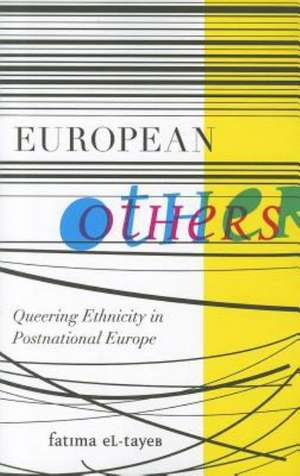European Others: Queering Ethnicity in Postnational Europe: Difference Incorporated
Autor Fatima El-Tayeben Limba Engleză Paperback – 22 iun 2011
European Others offers an interrogation into the position of racialized communities in the European Union, arguing that the tension between a growing nonwhite, non-Christian population and insistent essentialist definitions of Europeanness produces new forms of identity and activism. Moving beyond disciplinary and national limits, Fatima El-Tayeb explores structures of resistance, tracing a Europeanization from below in which migrant and minority communities challenge the ideology of racelessness that places them firmly outside the community of citizens.
Using a notable variety of sources, from drag performances to feminist Muslim activism and Euro hip-hop, El-Tayeb draws on the largely ignored archive of vernacular culture central to resistance by minority youths to the exclusionary nationalism that casts them as threatening outcasts. At the same time, she reveals the continued effect of Europe’s suppressed colonial history on the representation of Muslim minorities as the illiberal Other of progressive Europe.
Presenting a sharp analysis of the challenges facing a united Europe seen by many as a model for twenty-first-century postnational societies, El-Tayeb combines theoretical influences from both sides of the Atlantic to lay bare how Europeans of color are integral to the continent’s past, present, and, inevitably, its future.
Using a notable variety of sources, from drag performances to feminist Muslim activism and Euro hip-hop, El-Tayeb draws on the largely ignored archive of vernacular culture central to resistance by minority youths to the exclusionary nationalism that casts them as threatening outcasts. At the same time, she reveals the continued effect of Europe’s suppressed colonial history on the representation of Muslim minorities as the illiberal Other of progressive Europe.
Presenting a sharp analysis of the challenges facing a united Europe seen by many as a model for twenty-first-century postnational societies, El-Tayeb combines theoretical influences from both sides of the Atlantic to lay bare how Europeans of color are integral to the continent’s past, present, and, inevitably, its future.
Preț: 185.46 lei
Nou
Puncte Express: 278
Preț estimativ în valută:
35.49€ • 36.92$ • 29.30£
35.49€ • 36.92$ • 29.30£
Carte disponibilă
Livrare economică 24 martie-07 aprilie
Livrare express 08-14 martie pentru 23.99 lei
Preluare comenzi: 021 569.72.76
Specificații
ISBN-13: 9780816670161
ISBN-10: 0816670161
Pagini: 320
Ilustrații: 6
Dimensiuni: 140 x 216 x 23 mm
Greutate: 0.34 kg
Ediția:New.
Editura: University of Minnesota Press
Colecția Univ Of Minnesota Press
Seria Difference Incorporated
ISBN-10: 0816670161
Pagini: 320
Ilustrații: 6
Dimensiuni: 140 x 216 x 23 mm
Greutate: 0.34 kg
Ediția:New.
Editura: University of Minnesota Press
Colecția Univ Of Minnesota Press
Seria Difference Incorporated
Notă biografică
Fatima El-Tayeb is associate professor of literature and ethnic studies at University of California at San Diego.
Cuprins
Contents
Acknowledgments
Introduction: Theorizing Urban Minority Communities in Postnational Europe
1. “Stranger in My Own Country”: European Identities, Migration, and Diasporic Soundscapes
2. Dimensions of Diaspora: Women of Color Feminism, Black Europe, and Queer Memory Discourses
3. Secular Submissions: Muslim Europeans, Female Bodies, and Performative Politics
4. “Because It Is Our Stepfatherland”: Queering European Public Spaces
Conclusion: “An Infinite and Undefinable Movement”
Notes
Bibliography
Index
Acknowledgments
Introduction: Theorizing Urban Minority Communities in Postnational Europe
1. “Stranger in My Own Country”: European Identities, Migration, and Diasporic Soundscapes
2. Dimensions of Diaspora: Women of Color Feminism, Black Europe, and Queer Memory Discourses
3. Secular Submissions: Muslim Europeans, Female Bodies, and Performative Politics
4. “Because It Is Our Stepfatherland”: Queering European Public Spaces
Conclusion: “An Infinite and Undefinable Movement”
Notes
Bibliography
Index
Recenzii
"European Others is a ground-breaking study, a theoretical adventure, and a major contribution to the literature on European racisms, queer diaspora, immigration, queer subcultures, and queer of color critique. No other scholar, to put it plainly, has worked on these materials in this way; no other scholar has managed to launch the critique of European nationalisms from the vantage point of queer of color subcultural groups; and no other scholar has been able to weave together the strands of sexuality, gender, race, and resistance in such a daring and compelling way." —Jack Halberstam, author of The Queer Art of Failure
"Fatima El-Tayeb’s bold and graceful new book is an electrifying piece of original scholarship on contemporary ‘vernacular’ cultures of community-building in Europe. The world’s leading expert on minoritarian countercultures of art and activism in western Europe today, El-Tayeb sets entirely new standards for intersectional theories of race and sexuality in an age of accelerated transformation. Greater even than the sum of its very incisive parts, El-Tayeb’s European Others focuses on the lived experience of marginalized social groups to craft a new critical idiom for conceptualizing Europe, globalization, diaspora, and marginalization itself." —Leslie A. Adelson, Cornell University
Descriere
Considers the complications of race, religion, sexuality, and gender in Europeanizing from below










